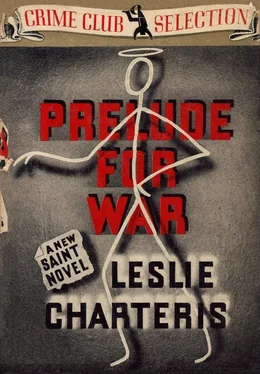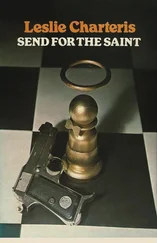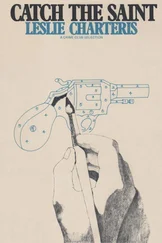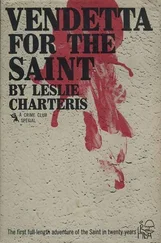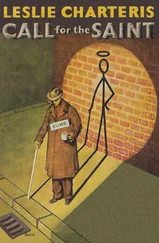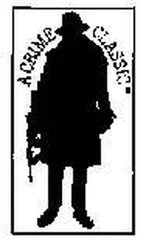"Go on."
The Saint poured out some more coffee.
"Now let's go to France. There they have a political Fascist organization called the Sons of France. It may or may not be illegal. I seem to remember that they passed a law not long ago to ban all organizations of that kind, and the old Croix de Feu was disbanded on account of it. The Sons of France may have found a way to get round the law, or the law may not give a damn, or they may have too much pull already, or something; or they may just be illegal and proud of it, and even if that's the case it's nothing to do with you. It's a matter for the French police."
"I'm listening."
"That's something. Well, from one indication and another it seems pretty clear that Luker is backing the Sons of France. That's natural enough. Dictators always go in for rearmament in a big way, and therefore Fascist regimes are good for business. Besides which, if you can get enough synthetic Caesars thumping their chests and bellowing defiance at each other it won't be long before you have a nice big war, which means a boom for the armourers. But it isn't a crime to finance a political party, or else half the titled people in England would be in the hoosegow. Unless the Sons of France are an illegal organization, in which case it's still a matter for the French police and not for you."
"You haven't got down to Kennet yet," Teal said sluggishly.
"Kennet was a pacifist, a Communist, and all kinds of idealistic — ist . He thought he could do a lot of good by showing up the arms racket. Old stuff. Dozens of people have done it before, and everybody says 'How shocking!' and 'Why can't something be done about it?' and then they go off and forget about it. But Kennet went on. He joined the Sons of France. And by some fluke he must have found out something that really was worth finding out; so he had an accident. But you still can't do anything about it."
"I can do something about wilful murder."
"I did say he was murdered, but that's just what seems obvious to me. I've no evidence at all. We both know Windlay was murdered, but I've no evidence to pin it on any particular person any more than you have. It's no good just saying that whoever did the actual jobs we know that Luker was at the back of them. What are you going to tell a jury? With people like we're dealing with, you'd want an army of eyewitnesses before you could even get a warrant. Even then I don't know if you could get it. They're too big. Look how you've already had the word from up top to lay off the case. British justice is the most incorruptible in the world, so they tell you; but you can always whitewash a crook if he's big enough because it isn't what they call 'in the public interest' that he should be shown up. And look at the circumstances of these Kennet and Windlay cases. It's a million to one that you could never get any conclusive evidence on either of them if you worked until you could tuck your beard into your boots."
Mr Teal rolled the pink wrapping of his chewing gum into a ball and went on rolling it. His china-blue eyes were still unwaveringly inquisitorial.
"I'll agree with some of that up to a point. But you know more than that. You know something else that you're still working on."
"Only one thing." Simon was calm and collected: he had made up his mind to be candid, and he was going through with it — it could do him no harm, only perhaps reduce the complications of Teal's interference. "Kennet fell pretty hard for Lady Valerie Woodchester, who was set on to him by Fairweather to try and steer him off. He talked to her a lot — I don't know how much he told her. And he left some of his evidence in writing. That's why the flat was torn apart when Windlay was murdered. They were looking for it. But it wasn't there. Lady Valerie's got it."
The detective's eyes suddenly opened wide.
"But—"
"I know," said the Saint wearily. "You're too brilliant, Claud, that's what's the matter with you. I know all about it. So all you've got to do is to go to Lady Valerie and say, 'Where's that stuff that Kennet gave you?' Well, you try it. I have."
"But if she's concealing evidence—"
"Who said she was? She did. To me alone — without witnesses. If you pulled her into court, she could deny every word of it, and you couldn't prove anything different."
"But what is she doing it for?"
"Champagne coupons."
"What?"
"Dough. Geetus. Mazuma. Boodle. Crackle paper. She's in business for the money, the same as I used to be. And she knows that that evidence is worth cash to Fairweather and Co. The only way you could break her down would be to talk her language, which means putting up more cash than the others will, which personally I don't propose to do and you in your job couldn't do." The Saint shook his head. "It's no good, Claud. You still aren't in the running. You can't even go after her and batter her with your sex appeal — not with a figure like yours. You're sunk. Why don't you pack up and go home to chivvying the poor little street bookmakers in Soho, where you can't go wrong?".
Chief Inspector Teal's ruminant jaws continued their monotonous mastication. The logic of the Saint's argument was irrefutable, but there was in Mr Teal an ineradicable scepticism, founded on years of bitter disappointment, that fought obstinately against the premises from which that logic took its flying start. The Saint might for once be telling the truth, but there had been many other occasions when he had been no less plausible when he was lying. All of Mr Teal's prejudices fought back from the dead end to which credulity inevitably led.
"That's all very well," he said doggedly. "But you're still working on something. And when did you stop thinking about money? Suppose you get this evidence — what's going to happen?"
"I wouldn't turn it over to you. I don't imagine it would help you. I only want it to make perfectly sure — to find out just how much there is behind this racket. I could deal with Luker and Company today without it. Mind you I don't want to put any ideas into your head, although there must be lots of room for them, but if Luker for instance should meet with a minor accident, such as falling off the roof of his house into Grosvenor Square—"
The telephone bell rang while the Saint was speaking.
He went over and picked it up while Teal watched him with broody eyes.
Simon said "Hullo," and then his eyebrows lifted. He said: "Speaking… Yes… Yes… Yes…"
Darkness gathered on Teal's face. Something leaden crept into his light blue eyes, like clear skies filling with thunder. Sudden brilliance flashed across them like the snap of lightning as a storm breaks. He came out of his chair like a whale breaking the surface. Surprisingly quick for his adipose dimensions, he plunged across the intervening space and snatched the phone out of Simon's hand.
"Hullo!" he bawled. "Chief Inspector Teal speaking… No, that wasn't me before… Never mind that, go on… What?… What's that?… Yes… Yes… "
An indistinguishable mutter droned on from the receiver, and as Teal listened to it his cherubic round face grew hard and strained. His eyes stayed fixed upon the Saint, hot and jagged with a seethe of violent emotions of which the most accurately identifiable one was wrath rising to the temperature of incandescence. His mouth was a clenched trap in the lurid mauve of his face, which now and again opened just sufficiently to eject a sizzling monosyllable like a blob of molten quartz.
"All right," he bit out at last. "Stay there. I'll be round presently."
He slammed the instrument back on its bracket and stood glaring at the Saint like a gorilla that has just got up from sitting down on a drawing pin.
"Well?" he snarled. "Let's hear what you've got to say about that."
Читать дальше
